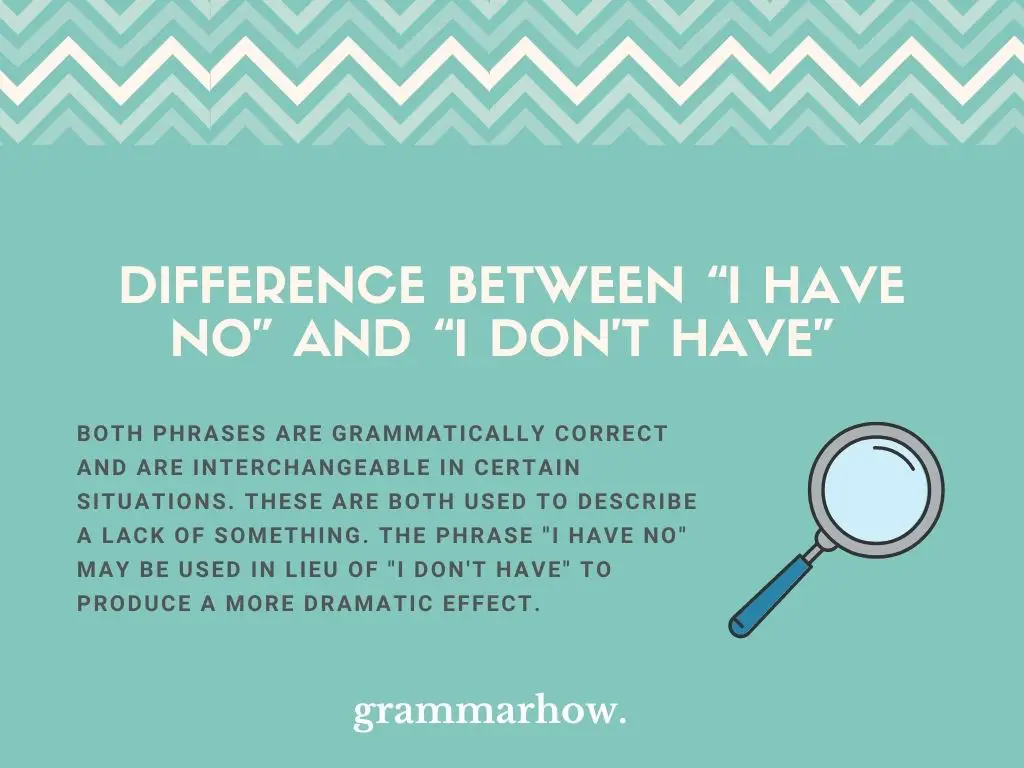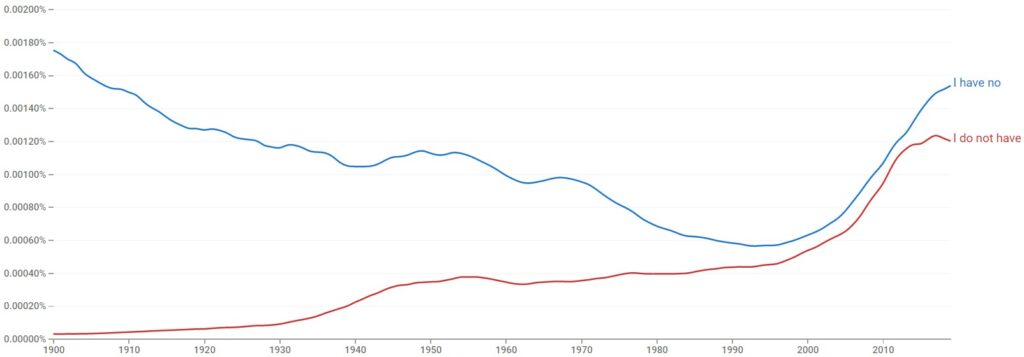There are many phrases in the English language that are interchangeable. At the same time, there are phrases used interchangeably when they aren’t supposed to. In this article, we’ll find out which category the phrases “I have no” and “I don’t have” belong to.
Difference Between “I Have No” and “I Don’t Have”
Both phrases are grammatically correct and are interchangeable in certain situations. These are both used to describe a lack of something. The phrase “I have no” may be used in lieu of “I don’t have” to produce a more dramatic effect.

Both the phrases “I have no” and “I don’t have” are grammatically correct. These phrases are both used to describe a lack of something, so it is usually followed by a noun.
These phrases are interchangeable in certain situations. Take these sentences, for example:
- I have no money.
- I don’t have money.
Both of the above sentences are grammatically correct. Both sentences are trying to convey the speaker’s lack of money.
The phrase “I don’t have” may be followed by a determiner such as “any” or “your”. As such, the second sentence above may be modified as follows:
- I don’t have any money.
In cases when there is a determiner involved, the phrases “I have no” and “I don’t have” are not interchangeable. In the example above, the phrase “I don’t have” cannot be interchanged with “I have no”:
- Incorrect: I have no any money.
I Have No
The phrase “I have no” is used to refer to the absence of something.
When you want to describe the absence of something, one of the phrases you can use is “I have no”.
This phrase is usually directly followed by a noun. It can also be followed by an adjective and a noun. Sometimes, it is used to add a dramatic effect to a statement.
Below are examples of how to use “I have no” in a sentence:
- I have no real friends, which is why I talk about my problems to strangers on the internet.
- How dare you betray me like this; as of this moment, I have no son!
- I have no prospects, no relationship, no money, and no family; my life officially sucks.
- I have no one to talk to, except for Kyle.
- You can keep flirting with me, I have no girlfriend or boyfriend.
- No, I can’t go out with you; I have no money to pay for our date!
- I have no idea what to do with my life.
I Don’t Have
“I don’t have” is a phrase that is used to refer to the lack or absence of something.
In a situation where you want to describe the lack or absence of something, “I don’t have” is one of the phrases you can use.
It is often interchangeable with the phrase “I have no”. However, “I don’t have” is sometimes the more straightforward way to put it, as opposed to the more dramatic effect the phrase “I have no” can add to a sentence.
The phrase can be directly followed by a noun, a pronoun, a determiner, or any other kind of adjective.
Below are examples of how to use “I don’t have” in a sentence:
- I don’t have any children, it’s just me and my partner.
- I don’t have many friends, which is why I cherish my time with you.
- I don’t have prospects, a relationship, money, or even a family; my life officially sucks.
- I don’t have anyone to talk to, except you.
- Let’s not go out tonight, I don’t have the money to pay for a date.
- I don’t have anywhere to go this weekend.
- I don’t have plans for the summer.
Which Is Used The Most?
According to data from Google Ngram Viewer, the phrase “I have no” is more popular than “I don’t have”.
Google Ngram Viewer can show us how often phrases are used in a wide range of books. According to data from books written in English between the years 1900-2019, the phrase “I have no” is more commonlyused than “I don’t have”.

Final Thoughts
The phrases “I have no” and “I don’t have” are both used to describe the lack or absence of something. Both phrases are grammatically correct and are interchangeable in certain situations. To produce a more dramatic effect, the phrase “I have no” may be used instead of “I don’t have”.
You may also like:
“Have Not” vs. “Do Not Have” – Difference Explained For Beginners
I Haven’t vs. I’ve Not – Difference Explained (+Examples)
I Haven’t vs. I Have Not – When To Use Each (+Examples)
